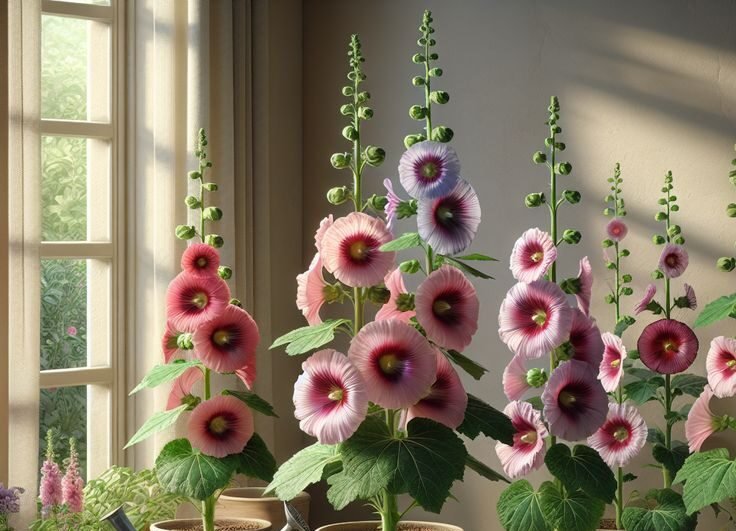Hollyhocks are stunning flowers that add charm and height to gardens. With their tall spikes of colorful blooms, they are a favorite among American gardeners. In this article, we will explore what makes hollyhocks so special, how to grow them, and tips for caring for these beautiful plants.
What Are Hollyhocks?
Hollyhocks, scientifically known as Alcea, are biennial or perennial plants in the Malvaceae family. They are known for their tall stalks, which can reach heights of 5 to 8 feet. Hollyhocks produce large, showy flowers that bloom in a variety of colors, including pink, red, yellow, and white.
Types of Hollyhocks
Hollyhocks come in several varieties, each offering unique beauty:
1. Common Hollyhock
This is the most popular variety, featuring tall spikes with large, colorful flowers. It blooms from summer to early fall.
2. Chater’s Double Hollyhock
These flowers are known for their double petals, giving them a fluffy appearance. They add a dramatic touch to gardens.
3. Black Hollyhock
With deep purple to nearly black flowers, this variety stands out and adds a unique flair to flower beds.
4. Peach Hollyhock
This variety has lovely soft peach-colored flowers that create a gentle, warm look in the garden.
Where Do Hollyhocks Grow?
Hollyhocks thrive in sunny spots with well-drained soil. They are native to Europe and Asia but have become popular in gardens across the United States. These flowers enjoy full sun and can tolerate a variety of soil types, making them versatile additions to many gardens.
How to Plant Hollyhocks
Planting hollyhocks is a straightforward process. Follow these steps for success:
1. Choose the Right Time
The best time to plant hollyhocks is in early spring or late fall.
2. Select a Location
Find a sunny spot in your garden. Hollyhocks need at least 6 hours of sunlight each day.
3. Prepare the Soil
Loosen the soil and mix in compost to provide nutrients. Hollyhocks prefer slightly alkaline soil.
4. Plant the Seeds or Seedlings
If planting seeds, sow them about ¼ inch deep. If using seedlings, space them about 2 feet apart to allow for growth.
5. Water the Plants
Water the newly planted seeds or seedlings lightly to help them settle in. Keep the soil moist but not soggy.
Caring for Hollyhocks
Once established, hollyhocks are relatively easy to care for. Here are some tips:
1. Watering
Hollyhocks need regular watering, especially during dry spells. Water deeply but infrequently to encourage deep roots.
2. Fertilizing
Fertilize your hollyhocks with a balanced fertilizer in early spring to promote healthy growth.
3. Staking
Due to their height, hollyhocks may need staking to prevent them from toppling over, especially in windy conditions.
4. Pruning
Remove spent flowers to encourage more blooms and maintain the plant’s appearance. In the fall, cut back the stems to about 6 inches above the ground.
Common Problems with Hollyhocks
While hollyhocks are generally hardy, they can face a few challenges:
1. Rust
Hollyhocks are susceptible to a fungal disease called rust, which causes orange spots on leaves. To prevent this, ensure good air circulation and remove infected leaves.
2. Pests
Watch for pests like aphids and spider mites. If you notice them, consider using insecticidal soap to manage the problem.
3. Damping Off
Seedlings can sometimes suffer from damping off, a fungal issue that affects young plants. To prevent this, use clean pots and well-drained soil.
Hollyhocks in Culture and Symbolism
Hollyhocks have a rich history in gardens and culture. They symbolize ambition, fertility, and beauty. In some cultures, they are used in herbal remedies and are celebrated for their ornamental value.
Conclusion
Hollyhocks are beautiful, towering flowers that bring a touch of elegance to any garden. With their vibrant blooms and easy care, they are a favorite among gardeners. By learning how to plant and care for hollyhocks, you can enjoy their stunning beauty all summer long. Whether you’re a beginner or a seasoned gardener, hollyhocks are sure to impress.
